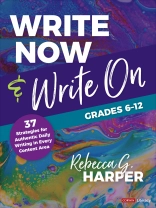From social media to school success—take student writing to the next level!
Your students may not realize it, but they’re already writers. All those informal text messages, Instagram captions, and Facebook posts have given them skills they can use as a springboard to the formal, content-specific writing they’ll need for success in school, college, and careers.
The key, of course, is practice—plus a little guidance from you. And you’ll be ready, no matter what subject you teach, because this essential reference is packed with relevant, contemporary teaching strategies that are easily customizable to work across content areas. Inside, you’ll find:
- Engaging exercises based in the kinds of writing students already do
- Versatile ‘parachute writings’—quick bursts of practice to drop into a day’s lesson
- Strategies for introducing academic vocabulary and making it stick
- Skill-boosting strategies for successful summarizing and using textual evidence
- Variations specific to all disciplines and content areas
Students should be writing daily, in all their classes, and they should be writing a lot, both inside and outside school. With this practical guide, you’ll be ready to help them up their writing game—and make literacy relevant, valuable, and authentic.
Tabela de Conteúdo
Acknowledgments
Write Now & Write On Strategies At a Glance
Chapter 1. Why Write Now?
Daily Writing Evolution . . . or Revolution?
Honor Many Different Kinds of Writing
The Call to Write Throughout the Day
Write Now . . . and Write On
Chapter 2. Parachute Writing: Strategies for Quick Writing
Parachute Writing Is Safe Writing
Pinpoint Placement
Timing Is Everything
Chapter 3. Sum It All Up: Strategies for Finding Key Details and Summarizing
Clarity Is Key
Get Real With Real-World Examples of Summarization
Chapter 4. All the Right Words: Strategies for Learning Academic Vocabulary
Background Knowledge Matters
Comprehension vs. Word Calling
Context Is Key
Chapter 5. Digital Worlds: Strategies for Meeting Students Where They Are Already Hanging Out
Finding Rigor in the Digital World
Making Meaningful Connections
Chapter 6. Just the Facts: Strategies for Finding and Using Textual Evidence
The Importance of Evidence
Quantity and Quality Make a Difference
Chapter 7. Expecting the Unexpected: Answers to Your Most Common Questions
What Do I Do About Students Who Aren’t Motivated?
What About Students Who Are Reading and Writing Below Grade Level?
How Can I Make a Large Task More Manageable?
What About Time? There Isn’t Enough of It
What About Behavior Challenges?
What If the Resources Needed Aren’t Available?
What About the Existing Curriculum?
You Can Do This!
Appendix A: Quick Reference Guide
Appendix B: Student Resources
References
Index
Sobre o autor
Rebecca G. Harper, Ph.D. is Professor of Literacy at Augusta University. She has served as an invited speaker and keynote for a variety of literacy conferences and has delivered literacy professional development sessions across the country. Her research interests include sociocultural theory and critical literacy and content and disciplinary literacy. She resides in Aiken, South Carolina with her children, Amelia, Macy Belle, and Vin.












